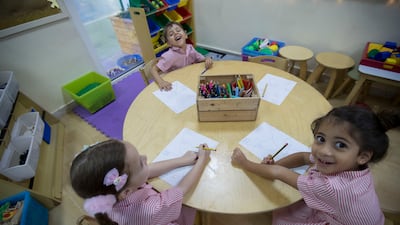It's that time of year again, when the summer begins to wind down and pupils flock back to school.
But for Dubai English Speaking School this is no ordinary back to school – this year marks the institution's 60th anniversary.
Remarkably, Dess has been around for longer than the UAE has been a country – long enough that there was a time when children arrived not in cars and buses, but on boats and camels.
Dess was established in a villa on the shores of Dubai Creek in 1963, when there were only about 20 schools in what was then called the Trucial States. As Dubai's first English language school at the time, Dess didn't have a set curriculum, and the first group of 10 British and American students were taught by some of the parents and a British serviceman, Flt Lt F Loughman, from the Royal Air Force Educational Corps.
Harry Atkinson, who was eventually appointed the school's first full-time teacher, previously told The National that prior to joining, "I couldn’t even find an atlas that mentioned Dubai" but sensed “something was going to happen and Dubai was going somewhere”.

Four years later, Dubai's Ruler at the time, Sheikh Rashid bin Saeed Al Maktoum, granted the school a piece of land in Oud Metha, where it remains to this day. In 1969, Sheikh Rashid granted a charter that gave a number of subscriber companies the right to elect a board of governors.
Throughout the 1970s, the school continued to grow and by 1974 it had four classes in each year group, running from reception to Year 5.
Ann Fulcher was a parent who ran two school fetes to raise funds for new facilities, one in 1976 and then in 1977, when Bernadette McCarthey took over from Dorothy Miles as head teacher.
"The first one paid for the swimming pool, and the second an Arabic teacher and classroom, also some percussion instruments. This ensured a better all-round education," Fulcher tells The National.

Before the new pool was built, pupils had swimming lessons at the British Forces pool in Sharjah, and later at a private Emirati residence on the Beach Road.
"I had a committee of mums. We stipulated the money raised would go to finance a swimming pool, which it did. This meant no more using the British embassy pool, thank heavens. We had great fun getting prizes. The Arabs and major companies were unbelievably generous," she adds.
Like many parents, Fulcher has fond memories of McCarthey, who served at the school for 20 years until 1996, and died in 2015.
"Bernadette was delighted with the idea of Arabic lessons and music," Fulcher says. "The education was more rounded with Bernadette."

Shirley James also sent her son to Dess, and has "so many memories of Bernadette McCarthy".
James says: "She was a brilliant lady. I remember sports day, when Bernadette would write on a chalk board who was in the lead. [It was a] clever trick to start writing the results to look like a certain house won, but then to magically flip her figures to display the true winners."
In the 1980s, the school built Latifa Hall, which would go on to host assemblies and school productions. An administration building was built in 1987 and inaugurated by Princess Anne.
Today, the school has more than 1,000 pupils, as well as a secondary school, Dubai English Speaking College, which was established in 2005. To mark its 60th anniversary, Dess has compiled 90-plus interviews and 400 photographs for a coffee-table book, honouring the students, parents, and teachers who have passed through its storied halls.
Among those featured in the book is Halle Orchestra violinist Victoria Stephenson, who traces her prolific career back to Dess.
Looking back to her time at the school, she says: “I was desperate to start playing the violin but kept getting told I was too small – there wasn’t a violin small enough. So instead, I joined the recorder club and choir with Miss Belsey; who later taught me music theory.

“I finally started group violin lessons with Mr Kudsi in a room at the back of the music room and remember running around and hiding behind things when it wasn’t my turn because I got so bored. All I wanted to do was play music.”
Having started playing violin at seven, while at Dess she became leader of the UAE Children’s String Orchestra before leaving in 1998 to take up a scholarship place at the Chethams School of Music in Manchester. Since, she has performed in London West End shows such as Les Miserables and Hamilton, as well as a David Bowie tribute at Glastonbury.
Keen to pay it forward, she has also staged concerts to raise money for Dubai children’s charities and Unicef, and leads outreach projects for Merton Concert Orchestra and String Busters.

“I can’t imagine not being a musician,” Stephenson says. “In fact, I don’t think I’ve ever doubted where I wanted to head since spending time with the Dess music teachers and Mr Kudsi.”
Reflecting on the school’s rich history and the generations of children it has educated, head teacher Catherine Dando says: “From school runs on abras and donkeys to swimming galas in a school parent’s pool, the book will be crammed with quirky memories and tales that have waited patiently for up to 60 years to be told.”
Meanwhile, school and college principal and chief executive Andy Gibb looks forward to building a better future: “It’s such a privilege to be able to watch tomorrow’s creators, thinkers and pioneers as they work out how they want to make their mark on the world.
"We’re fortunate to have so much history and so many bright and talented youngsters to build an equally bright future."















